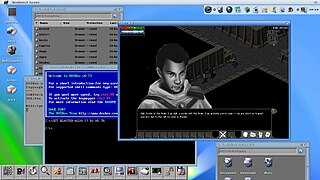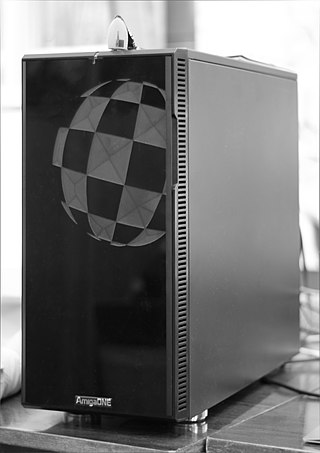
Amiga is a family of personal computers introduced by Commodore in 1985. The original model is one of a number of mid-1980s computers with 16- or 16/32-bit processors, 256 KB or more of RAM, mouse-based GUIs, and significantly improved graphics and audio compared to previous 8-bit systems. These systems include the Atari ST—released earlier the same year—as well as the Macintosh and Acorn Archimedes. Based on the Motorola 68000 microprocessor, the Amiga differs from its contemporaries through the inclusion of custom hardware to accelerate graphics and sound, including sprites and a blitter, and a pre-emptive multitasking operating system called AmigaOS.

Commodore International Corporation was a Bahamian home computer and electronics manufacturer with executive offices in the United States founded by Jack Tramiel and Irving Gould. Commodore International (CI), along with its subsidiary Commodore Business Machines (CBM), was a significant participant in the development of the home computer industry in the 1970s to early 1990s. In 1982, the company developed and marketed the world's second-best selling computer, the Commodore 64, and released its Amiga computer line in July 1985. Commodore was one of the world's largest personal computer manufacturers, with sales peaking in the last quarter of 1983 at $49 million.
AmigaOne is a series of computers intended to run AmigaOS 4 developed by Hyperion Entertainment, as a successor to the Amiga series by Commodore International. Earlier models were produced by Eyetech, and were based on the Teron series of PowerPC POP mainboards. In September 2009, Hyperion Entertainment secured an exclusive licence for the AmigaOne name and subsequently new AmigaOne computers were released by A-Eon Technology and Acube Systems.

Hyperion Entertainment CVBA is a Belgian software company which in its early years focused in porting Windows games to Amiga OS, Linux, and Mac OS. In 2001, they accepted a contract by Amiga Incorporated to develop AmigaOS 4 and mainly discontinued their porting business to pursue this development. AmigaOS 4 runs on the AmigaOne systems, Commodore Amiga systems with a Phase5 PowerUP accelerator board, Pegasos II systems and Sam440/Sam460 systems.

Cinemaware was a video game developer and publisher. It had released several titles in the 1980s based on various film themes. The company was resurrected in 2000, before being acquired by eGames in 2005.
Atari Corporation was an American manufacturer of computers and video game consoles. It was founded by Jack Tramiel on May 17, 1984, as Tramel Technology, Ltd., but then took on the Atari name less than two months later when Warner Communications sold the home computing and game console assets of Atari, Inc. to Tramiel. Its chief products were the Atari ST, Atari XE, Atari 7800, Atari Lynx and Atari Jaguar.

Amiga Corporation was a United States computer company formed in the early 1980s as Hi-Toro. It is most famous for having developed the Amiga computer, code named Lorraine.
The Amiga is a family of home computers that were designed and sold by the Amiga Corporation from 1985 to 1994.
Amiga emulation refers to the activity of emulating a Commodore Amiga computer system using another computer platform. Most emulators run on modern systems such as Microsoft Windows or Macintosh. This allows Amiga users to use their existing software, and in some cases hardware, on modern computers.
AmigaOS is the proprietary native operating system of the Amiga personal computer. Since its introduction with the launch of the Amiga 1000 in 1985, there have been four major versions and several minor revisions of the operating system.

Workbench is the desktop environment and graphical file manager of AmigaOS developed by Commodore International for their Amiga line of computers. Workbench provides the user with a graphical interface to work with file systems and launch applications. It uses a workbench metaphor for representing file system organisation.

AmigaOS 4 is a line of Amiga operating systems which runs on PowerPC microprocessors. It is mainly based on AmigaOS 3.1 source code developed by Commodore, and partially on version 3.9 developed by Haage & Partner. "The Final Update" was released on 24 December 2006 after five years of development by the Belgian company Hyperion Entertainment under license from Amiga, Inc. for AmigaOne registered users.

AmiKit is a compilation of 425 pre-installed and pre-configured Amiga program running on Windows, macOS, Linux computer, and on Amiga computer with Vampire V2 card.

AROS Research Operating System is a free and open-source multi media centric implementation of the AmigaOS 3.1 application programming interface (API). Designed to be portable and flexible. As of 2021, ports are available for personal computers (PCs) based on x86 and PowerPC, in native and hosted flavors, with other architectures in development. In a show of full circle development, AROS has been ported to the Motorola 68000 series (m68k) based Amiga 1200, and there is also an ARM port for the Raspberry Pi series.

AmigaOS is a family of proprietary native operating systems of the Amiga and AmigaOne personal computers. It was developed first by Commodore International and introduced with the launch of the first Amiga, the Amiga 1000, in 1985. Early versions of AmigaOS required the Motorola 68000 series of 16-bit and 32-bit microprocessors. Later versions were developed by Haage & Partner and then Hyperion Entertainment. A PowerPC microprocessor is required for the most recent release, AmigaOS 4.
ACube Systems Srl is a company that started in January 2007 from the synergy of the Italian companies Alternative Holding Group Srl, Soft3 and Virtual Works.

Amiga Forever is an Amiga preservation, emulation and support package published by Cloanto, allowing Amiga software to run on non-Amiga hardware legally without complex configuration.
The following history of the AmigaOS 4 dispute documents the legal battle mainly between the companies Amiga, Inc. and Hyperion Entertainment over the operating system AmigaOS 4. On 30 September 2009, Hyperion and Amiga, Inc. reached a settlement agreement where Hyperion was granted an exclusive, perpetual and worldwide right to distribute and use 'The Software', a term used during the dispute and subsequent settlement to refer to source code from AmigaOS 3 and earlier, and ownership of AmigaOS 4.x and beyond.

AmigaOne X1000 is a PowerPC-based personal computer intended as a high-end platform for AmigaOS 4. It was announced by A-Eon Technology CVBA in partnership with Hyperion Entertainment and released in 2011. Its name pays homage to the Amiga 1000 released by Commodore in 1985. It is, however, not hardware-compatible with the original Commodore Amiga system.

Commodore USA, LLC was a computer company based in Pompano Beach, Florida, with additional facilities in Fort Lauderdale, Florida. Commodore USA, LLC was founded in April 2010. The company's goal was to sell a new line of PCs using the classic Commodore and Amiga name brands of personal computers, having licensed the Commodore brand from Commodore Licensing BV on August 25, 2010 and the Amiga brand from Amiga, Inc. on August 31, 2010.











